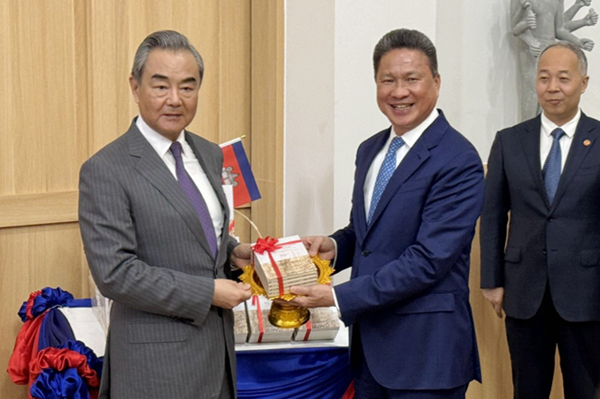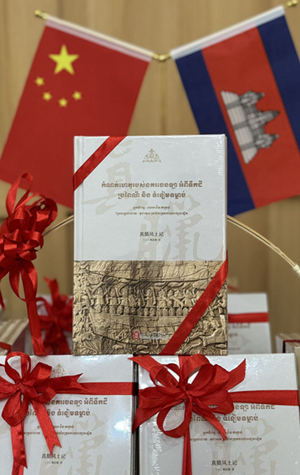- Research
- Research Centers
- Journals
- Admission
- Introduction
- Programs
- Application
- Alumni & Giving
- Alumni Club
- Giving
The Cambodian edition of The Customs of Cambodia was released in Phnom Penh, capital of Cambodia, on April 22.

Chinese Foreign Minister Wang Yi (L), who is also a member of the Political Bureau of the Communist Party of China Central Committee, and Cambodian Deputy Prime Minister Sun Chanthol (R) attend the launch ceremony of the Cambodian edition of The Customs of Cambodia. [Photo/bfsu.edu.cn]
Spearheaded by Gu Jiayun, vice-dean of the School of Asian Studies and director of the Centre for Cambodian Studies at Beijing Foreign Studies University, the Cambodian edition was translated with the collaboration of experts and scholars from institutions including the Royal Academy of Cambodia, the China Academy of Cultural Heritage, Yunnan University and Yunnan Minzu University.
The translation project received support from governmental institutions in China and Cambodia and was published by the Foreign Languages Press. Cambodia's former Prime Minister and Senate President Samdech Techo Hun Sen provided a foreword for the translated edition.

Cover photo of the newly released Cambodian edition of The Customs of Cambodia [Photo/bfsu.edu.cn]
The Customs of Cambodia by Zhou Daguan, a diplomat from China's Yuan Dynasty (1271-1368) who visited Angkor in the late 13th century, is an important source for scholars to study the ancient history of Cambodia. Previously, there were three Cambodian editions of the book, all translated by Cambodian scholars.
This newly published version was for the first time translated with Chinese scholars taking the lead. The translation was based on the authoritative annotated edition by prominent Chinese archaeologist Xia Nai while also referencing China’s latest archaeological data in Cambodia.
The release of the new Cambodian edition in the 2024 China-Cambodia People-to-People Exchange Year aims to facilitate the simultaneous updating of research results between Chinese and Cambodian academic communities, foster cultural consensus and prevent cultural misunderstandings. It is hoped that the book will serve as a bridge for communication between the two peoples.